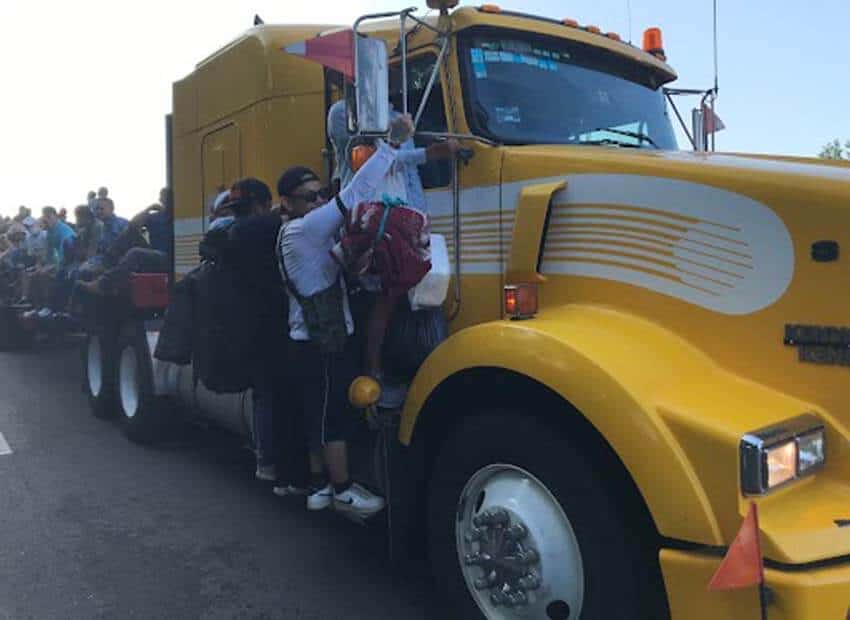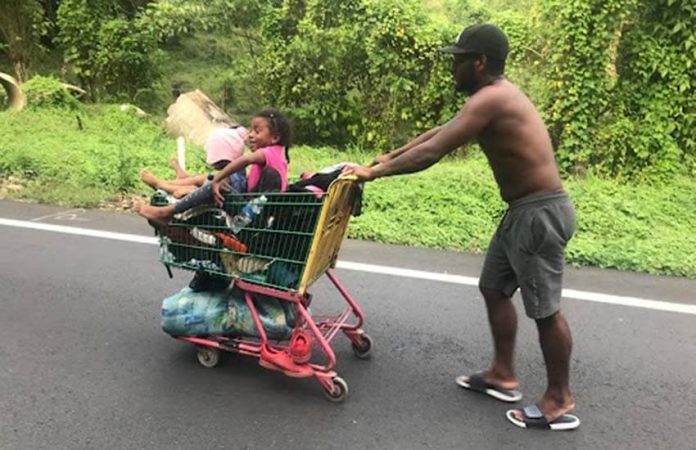Cold weather, a punishing pace, illness and the constant threat of detention or violence by Mexican authorities are taking their toll on the caravan of 2,500 migrants as it continues its journey northward through Mexico that began in Tapachula, Chiapas, on October 23.
The migrants walked 15 kilometers to the municipality of Mapastepec Saturday evening and rested on Sunday. There were complaints of cold on both Friday and Saturday night, and many children were reported sick. The National Immigration Institute (INM) said that five children and one adult contracted dengue fever, the newspaper El Sol de México reported.
The convoy reached the roadside village of Hermenegildo Galeana on Monday night, 120 kilometers from Tapachula.
But exhaustion is making some question their decision to participate. At least one family decided to abandon the caravan and take its chances with coyotes, human smugglers, in order to reach Mexico City. That method is dangerous and expensive but will seem increasingly tempting to families and slower walkers with enough money, who are struggling to keep up with the pace and the long distances.

“We’re very tired. The physical drain has been enormous … more than the physical tiredness, it’s the psychological exhaustion due to migration,” one migrant said late on Monday, referring to the constant threat of detention by authorities. “As long as our bodies can handle it, the fight will continue.”
Despite the hardship, the caravan appears to be growing, as migrants weave their way past immigration controls from Tapachula to join the convoy, organizer Irineo Mújica said.
They’d be well advised to exercise caution: the National Guard recognized its involvement in the killing of a Cuban migrant in Pijijiapán, Chiapas, on Sunday, about 36 kilometers north of where the caravan stayed the following night.
National Guard officers shot in the direction of a vehicle, killing the Cuban man and injuring four others, El Sol de México reported.
Before those details came to light, the INM stepped up its rhetoric against the caravan’s leaders, questioning their authority and accusing them of endangering the migrants. “It’s irresponsible that, due to the decisions of two people who call themselves leaders of the caravan, an agreement is not reached for authorities to provide foreigners with a regular immigration status, food and accommodation … to the detriment of their physical integrity,” it said in a press release on Sunday.
However, trust remains the stumbling block to reaching an agreement. Many migrants are fearful that once on an INM bus, they will be routed straight back to Tapachula, possibly to a prison-like detention center where many of them were held previously. That’s what happened to family members who were confronted by INM officials when they sought medical attention, El Sol de México reported.

Officials from a governmental organization that is observing the caravan said on condition of anonymity that the migrants’ mistrust of the INM was well-founded, and that promises to the contrary followed by a direct bus to Tapachula were an entirely plausible outcome of any deal.
The migrants are unlikely to receive another offer right away: Mexico is observing Day of the Dead through November 2, meaning holidays and reduced hours for many institutions.
Even before the Sunday shooting, the caravan was gaining political attention: Citizens’ Movement Deputy Salvador Caro Cabrera spoke in support of the migrants in Congress on October 28.
“The migrant caravan demands the attention of the federal government to achieve their proposal to gain asylum in our country. I could see from what hundreds of them told me that they haven’t had the treatment that the immigration law demands for them … We call on the federal government to resolve their migratory status before [the caravan arrives in Mexico City] to give freedom of transit to the [United States] border,” he said.
Mexico News Daily
